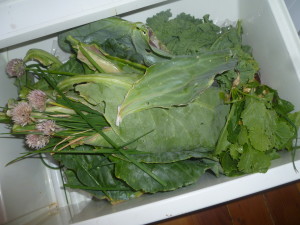
This week’s CSA (Community Supported Agriculture) package was “slim pickings” as our neighbor/urban farmer told us when she dropped it off this evening. With so many days of unseasonable heat, she told us, lots of plants are going straight to seed instead of following their usual growth cycle and developing into the mature veggies we depend on for food.
This is our first summer in Canada, so Andy and I have been enjoying the warm weather and the sunny, blue skies, amused by our northern friends’ extremely low tolerance for heat (they get the last laugh when winter rolls around and we are comically unprepared). But locals tell us that while these summer days are great for the beach, what we should be experiencing right now is “June-uary,” a return of colder weather and–most importantly–rain. Since Vancouver is located in a temperate rain forest, rainfall is extremely important for the plants, the animals, and, ultimately, the people who live here.
Because we’ve already had cloudless skies for so long, forest fires which would usually be a possibility in August are happening right now, and trees with shallow roots that depend on a certain level of moisture in the ground to keep them structurally stable are likely to be uprooted and fall. A changing climate means that growing seasons change, and many plants that might have thrived in the past are no longer viable.
It’s unfortunate to receive fewer fruits and vegetables through our CSA membership than we had expected, but that scarcity in itself demonstrates why community shared agriculture is so important in the first place, especially in light of the unpredictable effects of climate change on local ecosystems. When they pay for seed, labor, irrigation, and other inputs ahead of time, farmers are financially investing in their crops before knowing what the yield will be. They may put in months of work and go into debt for a harvest that is either to small to be profitable, or too plentiful to earn fair prices at the market. Either way, the conventional system expects farmers to take this gamble alone, even though every one of us depends on their hard work and investment in order to survive.
In community supported agriculture, consumers share the risk of agriculture with the farmers who feed us by paying for a share of the harvest at the beginning of the growing season. However things turn out, we’re in it together, and no single person will be economically devastated no matter how weather, pests, or economic forces may influence the harvest.